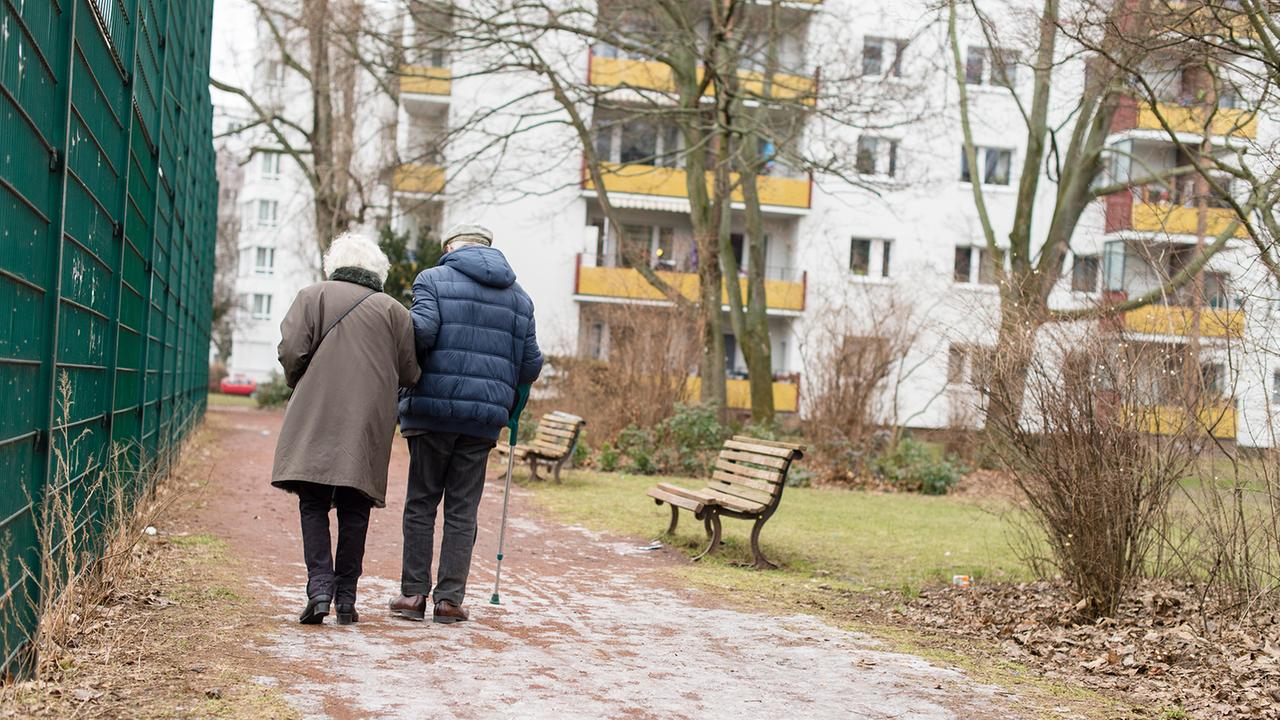Rents in Germany are rising and rising, and home ownership is also becoming more and more expensive. Experts warn that this will have a particularly severe impact on older generations.
“Let's go upstairs. That's my area now,” says Juliette Küsters and goes up the stairs. “This is my living room. Small but nice. Furnished to my taste. I'm happy here,” says the 69-year-old. Juliette Küsters lives in Romain Thies' house in Rodershausen in the Eifel. The two are a very special community of purpose.
Romain Thies and Juliette Küsters are not a couple, but they still live together – he on the ground floor, she on the first floor. They both clean their floor and cook together in the kitchen. She helps keep the house in good condition. Kuesters has helped renovate parts of the building over the years. She also helps the 71-year-old with household chores.
Since Thies can neither read nor write after an accident in his childhood, she also helps him with official paperwork. “I don't pay rent, just additional costs. My help around the house is compensation,” says Küsters. “I save money, Julia saves money. We do our work together and complement each other,” explains Romain Thies happily.
Rents are also becoming unaffordable in rural areas
Thies used to work as a shunter on the railway in Luxembourg. Eleven years ago he bought the house, which was then in need of renovation. Juliette Küsters has been living there for seven years now. She was previously self-employed as a housekeeper and childcare worker. Now she receives around 1,200 euros in pension per month. Even in rural areas, such low incomes are becoming more and more of a problem.
“No rental apartments in the region go for less than 800 euros. Then I wouldn't be able to afford anything – no car, no vacation and hardly anything else. Now I only drive a small car. Without a car you're at a loss here in the region “, said Kuesters. “Your cars get smaller and smaller over the years. The next thing is a walker,” jokes Thies and laughs. “At least you won’t have to pay insurance any more and you’ll save money.”
New study warns of increasing poverty in old age
The example from the Eifel shows a long-term trend in Germany: rent is becoming increasingly difficult for more and more people, even outside metropolitan areas. This is increasingly also true for seniors, according to the current study “Home Ownership in Germany”. The study was carried out by the Pestel Institute on behalf of the Federal Association of German Building Materials Trade (BDB) and was presented today at the “BAU 2025” trade fair in Munich.
“Rising rents are pushing more and more older people into poverty in old age,” says Pestel chief economist Matthias Günther. BDB President Katharina Metzger therefore demands: “Germany needs more social housing, more affordable rental apartments, but also more home ownership.”
The experts from the Pestel Institute criticize the current government policy. Günther speaks of “political failure”. “For average earners, the chance of owning a home today is zero. People's disappointment about this is enormous.” The federal government has failed to effectively promote home ownership, but this must become a permanent component of retirement provision in the future. “The rent quickly becomes overwhelming for older people in particular: those who retire are often hit by rent shock. For many senior households, the rent becomes co-rent. Or to put it another way: poverty in old age is renter poverty,” says Günther.
Long-term planning required
According to the study, there are also problems among younger population groups: “Most of the 25 to 45 year olds now live in rent. The state has essentially turned them into a complete rental generation,” says Günther. The scientists at the Pestel Institute have therefore drawn up a list of demands.
Above all, companies and citizens need reliability again for long-term construction and financing projects. “Anyone who gets into debt to the limit of what is possible doesn't want any risk – no surprises due to additional climate protection requirements, for example. Because people can't invest heavily again five or ten years after buying a property, for example in a new heating system or additional insulation.” said BDB President Metzger.
Costs too high for builders
There must also be effective support. The state has reduced its involvement here. “Social housing construction was originally – from the 1950s to the 1980s – about 40 percent promoting home ownership. Things have to go in this direction again,” says Günther from the Pestel Institute. Specifically, there should be a loan with a low, permanently fixed interest rate of around two percent.
The real estate transfer tax should also be eliminated if the property is used by oneself. This is currently 6.5 percent. This is a significant financing hurdle for many people.
According to the Pestel Institute, the high financing costs are a deterrent – fewer and fewer people live in their own four walls. The ownership rate in Germany is currently less than 44 percent – the lowest value in 15 years. The trend is continuing to decline: the number of households that live in their own home or condominium is continually falling. The goal must be to enable 500,000 households each year to purchase their own residential property.
shared apartment as Community of convenience
Even if this were to succeed, Germany would still be far behind in a European comparison, in second to last place. “An ownership rate of 50 percent or more like in Austria, the Netherlands and Sweden would, above all, bring more social stability,” says Matthias Günther.
In Rodershausen it is time for afternoon coffee. The senior duo meets in the kitchen. When Romain Thies cuts the cake, he has fundamental thoughts – and not just about himself. “Who can afford a retirement home today? That's also a problem. If the state doesn't add anything to it, many old people can no longer afford it .”
Juliette Küsters listens and nods. “Everything is subsidized. I now get 20 euros more in my pension. I have to pay taxes and health insurance is becoming more expensive again,” explains Küsters as she thoughtfully stirs her coffee. “And how many additional medications I have to pay for. That's already 150 euros. It doesn't get any easier.”
Both are still satisfied with their shared apartment in the Eifel and hope that it stays the same for a long time. But if owner Romain Thies dies one day, Juliette Küsters would have to look for a new place to live. Your prospects for a new apartment would be rather poor because, according to many experts, the problems on the real estate market are likely to last for many years.





